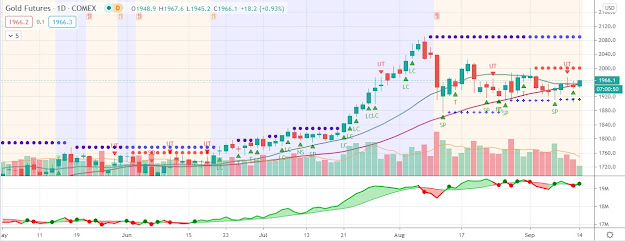Gold prices fell as investors and traders priced a lower probability of a fresh round of quantitative easing (QE) into asset markets
 The gold price declined Monday, sinking $11.00 to $1,714.80 per ounce. Gold prices fell as investors and traders priced a lower probability of a fresh round of quantitative easing (QE) into asset markets. Today’s weakness follows last Friday’s $33.99, or 1.9%, drop – its worst showing in over a month. The better than expected U.S. jobs report appeared to dim the prospects for a third round of QE from the Federal Reserve. The gold price surrendered its entire weekly gain and snapped a four-week winning streak.
The gold price declined Monday, sinking $11.00 to $1,714.80 per ounce. Gold prices fell as investors and traders priced a lower probability of a fresh round of quantitative easing (QE) into asset markets. Today’s weakness follows last Friday’s $33.99, or 1.9%, drop – its worst showing in over a month. The better than expected U.S. jobs report appeared to dim the prospects for a third round of QE from the Federal Reserve. The gold price surrendered its entire weekly gain and snapped a four-week winning streak.Commenting on the jobs data and the gold price, Saxo Bank’s Ole Hansen stated that “I think people are asking some questions now with regards to the Fed’s view about low interest rates into 2014. If job creation carries on at this pace, that could be revised, thereby removing some of the support for gold.”
Camilla Sutton, chief currency strategist at Scotia Capital, offered a similar assessment in a note to clients. “Today’s release is a very positive report and will soothe some of the deeper concerns at the Fed. I think increasingly (QE3) is being pushed to the background.”
Alternatively, Miller Tabak’s chief economic strategist, Andrew Wilkinson, offered a more cautious view on the impact of the employment report. “No doubt this is an extremely strong report and nobody will dislike it. The back revisions indicate the economy was stronger than expected. Overall a healthy report. Having said that, this should not change the Fed’s view as it is one month’s report. Certainly the Fed will welcome it but they remain worried about other areas of the economy, namely housing. This should not change its view on the economy.”
As for the coming week, the Federal Reserve will have far fewer reports to comb through as the U.S. economic calendar is particularly light. The only notable data consists of reports on Consumer Credit on Tuesday, weekly jobless claims on Thursday, and University of Michigan Consumer Sentiment on Friday. As such, the European sovereign debt crisis and other global macroeconomic developments are likely to have a greater impact on the direction of the gold price in the days ahead.



Comments
Post a Comment